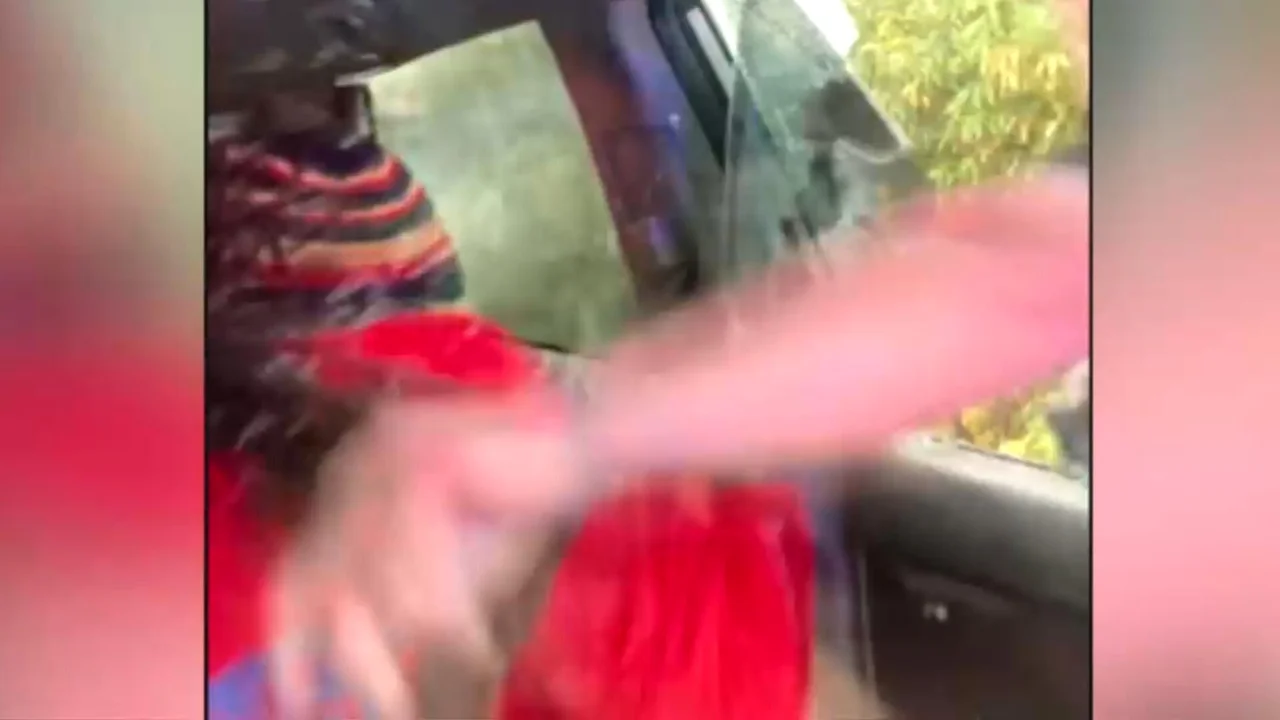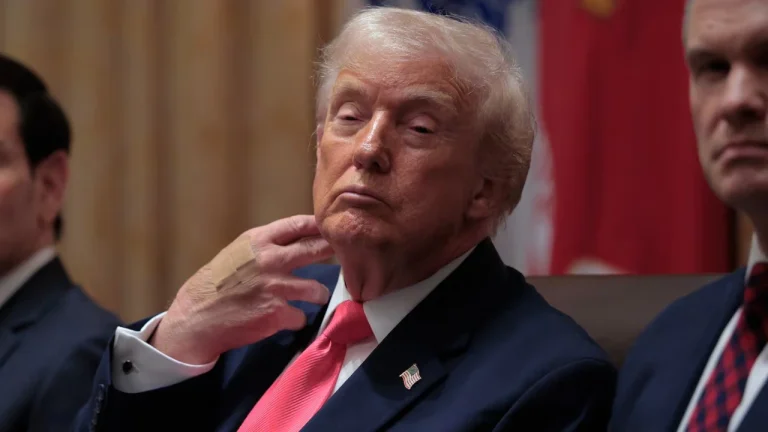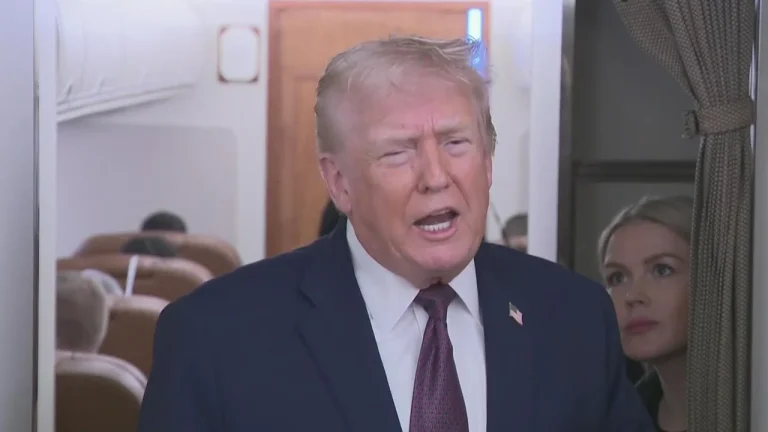NOTE: VIDEO AT THE END OF THE ARTICLE.
A newly surfaced video showing a Jacksonville sheriff’s officer smashing a car window and striking a driver in the face during a February traffic stop has sparked an internal investigation, public outcry, and a wave of media attention.
The incident, which occurred on February 19, 2025, began with what appeared to be a routine traffic stop. William McNeil Jr., a 22-year-old Florida resident, was pulled over by Officer D. Bowers of the Jacksonville Sheriff’s Office, who initially cited McNeil for driving without his headlights on during poor weather conditions. What followed, however, was anything but routine.
McNeil shared his own recording of the traffic stop to social media on Sunday, writing that he asked to speak to a supervisor but was instead met with sudden escalation. His video, captured from inside the car, shows an officer breaking the driver’s side window and immediately punching him in the face before pulling him from the vehicle with the help of additional officers. In the caption, McNeil described the trauma he endured, stating he had not been able to mentally process the event for months. He also revealed he had suffered a chipped tooth, required stitches in his lips, experienced a concussion, and suffered short-term memory loss as a result.
The video quickly gained attention online, prompting the Jacksonville Sheriff’s Office to acknowledge the footage and confirm that both criminal and administrative reviews were underway. Though the State Attorney’s Office determined no criminal laws were broken by the involved officers, an internal investigation remains active. Officer Bowers has since been stripped of duty.
The official arrest report, obtained by McNeil’s attorneys and shared with CBS News, paints a different picture than the video suggests. Officer Bowers claimed McNeil was not wearing a seatbelt and failed to produce his license, registration, and proof of insurance after multiple requests. The officer said McNeil’s refusal to comply prompted him to call for backup. When McNeil allegedly reached for the vehicle’s floorboard, Bowers claimed he saw a large knife nearby and acted accordingly.
However, civil rights attorney Ben Crump, who is representing McNeil, strongly contests the officer’s account. Crump argues the narrative in the arrest report “is completely divorced from reality,” pointing to video evidence that appears to contradict several claims. According to Crump, McNeil was clearly wearing a seatbelt in the video, made no sudden movements, and at no point reached for a weapon. He also noted that the officer’s physical assault—captured in the video—was not even mentioned in the arrest report.
“The only time he moves at all is when the officer knocks him over by punching him in his face,” Crump said in a statement. “Then this young man calmly sits back straight and holds his empty hands up.”
McNeil was charged with resisting an officer without violence, as well as possession of marijuana and drug paraphernalia. He later pleaded guilty to resisting a police officer without violence and to driving with a suspended license, according to Sheriff T.K. Waters. At a news conference Monday, Waters also released bodycam footage from the incident and emphasized that the viral video didn’t capture the entire context. In his words, it “did not comprehensively capture the circumstances” and left out the events that led to Officer Bowers’ decision to escalate.
Waters further stated that although the officer’s conduct is under review, the law requires individuals to comply with lawful commands during a traffic stop, even if they disagree with the reason. “A person must comply with an officer’s commands, even if that person disagrees with that officer’s reasons for the stop,” he said. He also noted that no official complaint had been filed prior to McNeil’s social media post.
Still, Crump argues that legal obligations do not justify excessive use of force, especially when the facts are in dispute. He also emphasized the larger racial context, calling the incident “a disturbing reminder” of how basic requests for clarity or legal rights can escalate into violent confrontations for Black Americans.
Body camera footage released by the sheriff’s office shows Officer Bowers asking McNeil why he opened the door instead of rolling down the window. McNeil responds that his window doesn’t work. Bowers then asks for identification once and quickly shifts to ordering him out of the car. McNeil closes the door and requests a supervisor. At that point, Bowers calls for backup. Another officer is seen speaking to McNeil from the passenger side before the window is broken.
Authorities also shared an image of the knife allegedly visible on the car’s floorboard, though its proximity and relevance remain points of contention.
For McNeil, the ordeal has left lasting emotional and physical scars. “This was very hard to do,” he wrote in the caption accompanying his video. “I’m not mentally healed from this but I had to get the word out eventually.”
As the internal investigation continues, the case has reignited broader debates around policing, accountability, and the disproportionate use of force in minority communities. With high-profile legal representation and viral attention, this Florida traffic stop may become a flashpoint in yet another national conversation on civil rights and justice in law enforcement.
PLAY:

Sarah Mitchell is a bestselling novelist recognized for her insightful and emotionally resonant stories that explore the complexities of human relationships. Originally from Denver, Colorado, Sarah grew up in a family of teachers who nurtured her curiosity and love for storytelling. She studied psychology at Stanford University, where she became fascinated by the intricacies of human behavior—an interest that would later shape her writing career. Sarah’s novels are praised for their nuanced characters, intricate plots, and ability to capture the subtle tensions that define love, friendship, and family ties. Her breakthrough novel, The Spaces Between Us, became an instant bestseller, lauded for its honest portrayal of strained family relationships and the fragile bonds that hold people together. Since then, she has published several works that continue to captivate audiences around the world. Outside of her writing career, Sarah is passionate about mental health advocacy and often partners with organizations to promote awareness and support for those struggling with emotional well-being. Her personal life is quieter—she enjoys hiking in the Colorado mountains, practicing yoga, and spending time with close friends. With each new book, Sarah Mitchell cements her reputation as a writer who illuminates the beauty and struggles of human connection.









